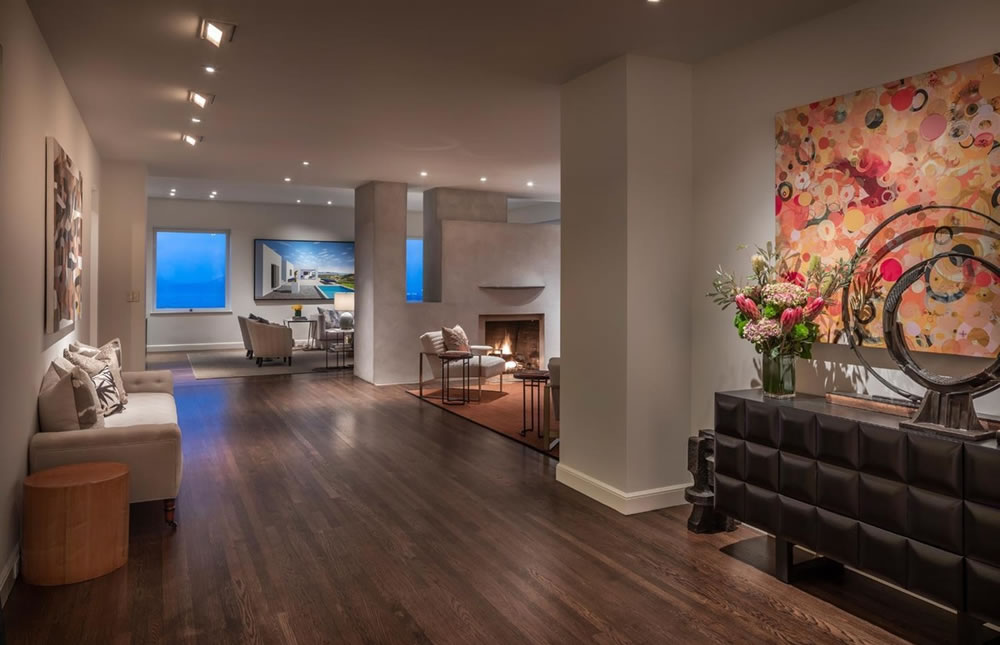The 5,180-square-foot “Haas Penthouse” atop 2100 Pacific Avenue, “one of the most important penthouse apartments in San Francisco,” according to its sales agents, with extensive wall space that was positioned as a feature “for a serious art collector’s “Gallery in the Sky,” hit the market priced at $14.75 million in early 2018.
Reduced to $13.275 million in September of 2018, dropped to $10.95 million in January of 2019, reduced to $9.95 million that April and then further reduced to $8.95 million that June, the five-bedroom unit was relisted anew for $8.95 million in September of 2019.
Reduced to $7.95 million in October of 2019, a price at which it was relisted anew earlier this year, the list price for the “showcase in the sky” was dropped to $6.95 million in September. And the sale of the penthouse atop 2100 Pacific Avenue has now finally closed escrow with a contract price of $6 million, which was officially “within 14 percent of asking” according to all industry stats but 59 percent below its original list price and expectations at the time.





Even for a property requiring a complete remodel that seems very low given the address/floor position. This is no 2500 Steiner, but it ain’t chopped liver.
Any insights on details that would’ve depressed the price?
As visible from Broadway, the unit below has full picture windows facing the bridge, while this unit has 4 standard double-hung windows. From that perspective, despite being the highest unit, it is not ‘the best’ and it is therefore a hard sell at a penthouse premium.
Who puts janky craftsman divided light double hung windows in a penthouse?
I have no idea who pays $6mm for an apartment, even one this nice. But still, it approaches the SF standard $1K psf rule. Marin is headed the same way.
Do you get one parking space or two? You should get two if you have 5,180sf.
(Nice Streetview, Looking Up. There should have been a drone shot included in the marketing.)
I don’t think the non-optimal windows explains the $1000/sq ft at that address with those views, there’s gotta be something else going on.
Again, this is no 2500 Steiner (which has all double hung windows too) for many reasons, but paying 1/4 the $/sq ft just a few blocks away still doesn’t add up to me.
2 things come to mind:
1) Co-ops in SF are somewhat rare/annoying to be a part of, unless of course, you’re in 2500 Steiner and your fellow board members are a who’s who.
2) Compare the images from #9’s 2009 sale and then ask yourself, ‘Will I obligate myself to pay higher coop dues than this unit and pay to move walls (or at least that fireplace – it’s telling that the Zillow listing ‘virtually remodels’ the space) knowing that the coop will never let me replicate their windows?”
Sorry, 2500 Steiner is *mostly* double hung widows.
Look at the listing for #6 at 2500 Steiner. Sure, they’re double hung, but they are *significantly* more dense (most are in groups of 2 or 3); on the view side, they are picture windows and on the city-facing side, there are full-height doors to the fire escape.
Even just looking at the photos, you are *much* more connected to the view in 2500 Steiner.
Further proving that point is the >50% per square foot discount the ‘limited view” #3 got in its recent sale vs. #6’s recent sale (for otherwise identical floorplates).
yeah, reality.
2018 was deep in the heart of irrational exuberance (as opposed to Texas) in San Francisco with buyers willing to pay exorbitant prices for properties. Prices that did not reflect reality. I assume the seller in 2018 hoped to hook one of these all too willing to pay anything buyers.
The new reality is that, more and more, buyers are not willing to pay a premium for SF properties. That said, the 50% drop is suspect – were comp properties like this actually selling for 14.75 million in 2018? Apparently not as this place didn’t sell. Yes, there has been a drop but it is overstated in this case due to the over-the-top asking price in 2018.
Didn’t SF crack down on international buyers using shell companies to buy real estate?
Maybe that?
Not sure what sort of teeth San Francisco has to regulate the matter but on a Federal level (probably enforced by FinCEN?) the Corporate Transparency Act of 2020 makes anonymous purchases through shell companies (often used to launder money) a lot harder. It’ll be interesting to see what sort of correlation that has to big-city, top-end condo prices going forward.
Also, this condo looks hella 90s—like if Frasier’s pad had low ceilings (or technically, ceilings at all). If money is no obstacle, one could do better.
Tangentially: with so many old buildings, I’m surprised co-ops are so rare in San Francisco.
HOA is $6,259 monthly … that’s considerably higher than our full mortgage payment, which includes our escrow portion!
Well do you also live in the entire top floor a full-service building with views of both bridges?
I’m not comparing our home to this penthouse, just stating my shock at the additional monthly payments. I’m not part of that world.
“A man’s got to know his limitations” – Harry Callahan, San Francisco, 1973
Don’t forget this is a COOP – so the HOA $6,259 monthly includes the property tax for this unit.
Not necessarily. Our Coop HOA doesn’t include property taxes. Some may, but it’s hardly a rule.
On second thought, the property tax on a $6m unit would be $6,000/month, so there’s no chance that HOA includes it.
You may be correct, but there is no tax history presented, which leads one to believe it’s included in the HOA. The PH last sold in 1992 and with Prop.13 protections the PH share of the property tax would be much less than you are suggesting…perhaps in the 1k – 2K range.
I looked at this one and considered making an offer but couldn’t reconcile the relative lack of picture windows and broken up views (aka the extensive wall space).
Initial list price is kind of irrelevant, no? What matters is the sale price.
The editor’s point, which I think is a salient one no matter how many times it’s made on here 🙂 is that the R.E. industry (particularly brokers) like to trumpet sales “above asking!” or “under contract in days”, which in fact the reality is quite different. From purely anecdotal evidence (albeit across both coasts), R.E. brokers’ reputation is down there around car dealers at this point – people are inclined to discount (no pun intended) virtually any broker’s statement. And frankly that’s not a good professional posture to have.
That may be true, but outside of the R.E. industry, who cares about ‘over asking’? If I’m buying or selling my house (or a car or a painting or any asset) what I care about is how much money it goes for.
Specifically, if I’m looking to sell a house, would I rather have a broker who sells it ‘over asking’ or do I want a broker who sells it for the most money?
Because many realtors feel it is their job to make people think they should buy right now.
At every open house, the Realtor seems to dwell on the one house that was the most purposefully underpriced in the city and say, loudly, “Can you BELIEVE that? It had 75 offers and went over by $1M” to try to imply that the market is ON FIRE and you’d better buy now or be priced out forever.
Similarly, when the market is tanking, and expectations of sellers are wildly unrealistic, the buyers are better off waiting until expectations match reality. So the realtors point out that this house only sold for under by a little bit, to make potential buyers think there’s no need to wait, and that they should bid about the asking price. Even if the market is not actually tanking, the realtors fiercely fight to keep from the public any cracks that might be appearing.
Fortunately, the editor knows that there are a continuous supply of new buyers wandering in to this site, and so he needs to continually educate them about the manipulative tactics of some realtors.
Really? Is there anyone out there who trusts everything every realtor says?
So that’s the reason for the continuous “Gotcha!” stories informing us that–shockingly!!–realtors aren’t to be trusted. Maybe there really are people out there who trust every single realtor’s marketing material.
I’m not even in real estate, and I don’t give a damn about “over asking” when I buy or sell property.
SFRealist – Yes, there are gullible buyers and the vast majority of retail buyers have less experience and knowledge than the real estate firms brokering properties.
“… outside of the R.E. industry, who cares about ‘over asking’?”
I’ve heard several retail buyers talk about the RE market in terms of whether properties are going over or under asking, including in my own family. Sometimes I can successfully explain why this metric is meaningless though more often I get blank stares. I think it might be the allure and simplicity of over/under. Why try to understand the market dynamics when you can simply take a listing price and multiply it by 120% to arrive at an acceptable offer? Economics is hard, multiplication is easy.
Maybe you’re right. I am not deeply connected with the RE industry. If that is true, it makes no sense to me. When I buy or sell, all I care about is the sale price.
“Is there anyone out there who trusts everything every realtor says?”
But… that’s the point. In theory – historically, and technically still true today – brokers are held to standards and when you retain your own broker (through a written agreement) they’re supposed to represent your interests and be professionals. Imagine if, say, doctors constantly changed the goalposts – you’re trying to find a surgeon, and you see ads by one trumpeting a 99% survival rate (with the unstated qualification that that’s for people who made it past the first hour of post-op recovery).
Basically, a person engaging in the largest economic decision of their life shouldn’t have to suspect and parse everything that their own broker is saying – nor have an overall distrust of the system as a whole.
Top story on SFGate right now: “San Francisco home sells for $1 million over asking price”
My reaction is the same to that story. What really matters is the price. Not the price over (or under) asking.
In the unfortunate situation of a lack of appropriate Picasso paintings, if the new owner wishes to create bigger picture windows on the north side, the coop will almost surely have no objections.
The comparison to 2500 Steiner is not apt. The apartments there are much smaller than this one. There was a time when 2500 was considered suitable for retirement downsizing from Presidio Heights houses. I had a friend, now long gone, who did just that.
My comment was that it *wasn’t* (quality/location) comparable to 2500 Steiner, but is it *so* different to sell for 1/4 the $/sq ft?
Also, am quite sure that 2500 Steiner is still considered “suitable for retirement downsizing”.
My understanding is that the owner in the unit below the PH has quite a grip on the board, and simply will not allow anyone to remodel or make noise. People were deterred from buying because of the myriad and many restrictions imposed because of said neighbor’s inflexibility. His unit and the PH are the only full floor units in the building.
Another tidbit: a prior owner of the unit below the PH put in the picture windows without permits. There are some load bearing structural issues between that unit and the PH. This issue would actually be mitigated if the PH also took out concrete and installed picture windows along the north side of the unit. But grumpy guy below the PH is resistant to absolutely everything.
That’s interesting information. Details when the un-permitted windows installation on floor below PH took place? It seems amazing the co-op Board would allow such renovation to the building when they could be liable for any future damages? And you do you get this by the district Building Inspector when the side of the building is opened up, and then also no one complains? Strange stuff.
Interesting!
This is the kind of information (screwed up renovation process, structural issues, f**ked up board/neighbors) I was looking for with my questions above.
That’s the kind of thing that could depress the price below what you might expect given just the basic facts!
Also, interesting that there are only two full floor units in that building, another thing that might depress pricing.
This is the sort of information which the buyer and seller must have known. It explains a great deal. When the owner below leaves or dies, the value of this unit may climb. So if guy below is old enough, and the PH buyer is young enough, this may turn out to be the best deal of the year. This is one of the reasons that coops are less desirable than condos, and often cheaper, not just here but in NY and other places.
Huh?
There are definitely downsides for a Coop (many don’t allow a mortgage), but neighbor/board/renovation hassles can happen in condos just as easily as in Coops.
Interesting indeed!
On Redfin, they show a floor plan for the PH, but it appears to be for a full remodel, not the existing layout. I wonder how that figured into the story.